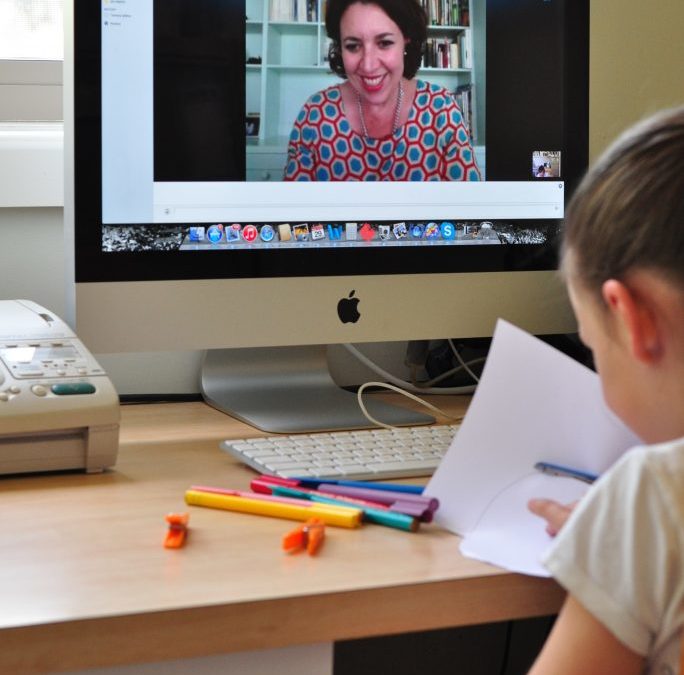Engagement in therapy – what is it and how does online therapy support this?
As we see a rise in demand for online therapy, new research by Dr. Felipe Retamal-Walter, The University of Queensland, and in partnership with Therapy Connect, supports and champions online therapy in delivering accessible and evidence-based approach to goal attainment through family-centred engagement.
Online therapy offers a unique advantage as it relies on effective engagement, defined as ‘caregivers/clients working collaboratively with the therapist to support participation.’
Because online therapy offers a physical distance between therapist and child, it empowers caregivers/families to take an active role in supporting their child in reaching their goals. This approach builds competence and confidence of the caregiver/family and enables therapy strategies to be implemented and integrated into the child’s natural contexts and routines.
Key findings we will discuss in this article are:
- What are the advantages to online therapy for children and families?
- How can therapists build engagement necessary for achieving outcomes?
At Therapy Connect, our highly-qualified practitioners connect with clients remotely via Zoom, at a location and environment that is comfortable and convenient for the child and caregivers/family. As therapists are not “physically present,” this puts the family in the driver’s seat, and they become key agents in the process, playing active roles in goal attainment.
Uniquely, online practitioners become the coach and facilitate caregivers to implement therapeutic strategies into natural routines and contexts of the child. This collaborative approach enhances the caregivers/parent’s competency and confidence, building skills to support their child which can lead to faster outcomes as these skills are integrated and practised in their natural social environment (home, school, etc.).
Online therapy removes barriers such as travel, location and increased flexibility around scheduling and appointments, with unique advantages of multiple location attendance, recorded sessions, and improved regular attendance. The flexibility and innovation of online therapy means more family members can attend and be involved, creating an empowered, family-centred approach to goal attainment, and help children reach their full potential in their natural environments.
How can therapists build engagement necessary for achieving outcomes?
As Australia’s leading online NDIS allied health provider, this research validates the incredible work Therapy Connect practitioners have been doing for almost 7+ years, aligning with Retamal-Walter suggested framework to deliver engaging and evidence-based outcomes.
The delivery of family-centered telepractice is essential for engaging children and families.
To effectively create a family-centred approach to online therapy, practitioners need to place the family at the centre of the intervention, facilitating child and family engagement. To achieve this, practitioners focus on parent-professional collaboration and build unique relationships with all involved, both the child and caregivers/families, to support outcomes. They build rapport, take time to understand the family dynamic and tailor strategies to suit the natural environment of the child. This relationship ensures the child’s support and social network are engaged in therapy during after sessions, giving caregivers/families a key role in facilitating child engagement and goal attainment.
Engagement in telepractice is variable and affected by child, parent, and professional factors
Telepractice presents a unique set of variables, and practitioners must consider these factors to maintain engagement through online therapy. Practitioners need to be agile and creative, responding to the unique conditions of online therapy and adjust the sessions as needed, acknowledging factors such as technology, environment, access to tools and resources etc.
Both parent and professional factors affect the development of engagement during telepractice.
Engagement is an investment that requires time, consistency, and technology
Effective engagement must adapt to the online environment, requiring time, consistency and technology proficiency. Technology can either facilitate or hinder child and family engagement. Practitioners must ensure those involved have the skills and tools to effectively undergo online therapy. Family engagement in online therapy is a process built over time requiring consistency and frequency over several sessions. Whilst flexibility is an advantage, consistency must be maintained and prioritised.
Maximising communication interaction during telepractice sessions encourages
Online therapists must be exceptional communicators, ensuring all involved (child, professional, caregivers/parent) are engaged in the process. Uniquely, communication in online therapy means you are addressing both the child and caregivers/parent or family. Reciprocal communication facilitates child and parent engagement and practitioners need to be conscious of their communication style while interacting during telepractice sessions.
Practitioners must find ways to engage remotely by following the child’s lead and adjusting the level of participation. Remember to:
- Give children a voice
- Follow preferences and interests
- Change the tone of voice and eye gaze
- And adapt to the environment where telehealth sessions occur (home, office, school etc.)
Joint planning and preparation facilitates child and family engagement in telepractice
The success of online therapy being delivered in the child’s natural social environments relies upon effective joint planning and the preparation of the remote location (home, school etc.)
Practitioners need to plan and adjust online therapy sessions to maximise child and parent engagement. This includes confirming a location (home, school, etc.), preparing for multiple location attendance and ensuring their environment is set up for maximum engagement. The practitioner encourages caregivers/parents to take advantage of the home environment, leverage home context and materials which can improve outcomes as these are accessible to the child and caregivers/parent at all times.
The advantage of online therapy means practitioners can be more flexible and responsive, enabling the child and caregivers/parent to optimise their natural environment. Practitioners can adjust the session, introduce new activities, scaffold activities baked upon responses, include movement breaks, visual schedules and games which generate more opportunities to build engagement and introduce these activities and resources into their routines beyond sessions.
Final Thoughts
As more research is available, we move past telepractice being ‘as effective’ as face to face services, and understand the unique and exciting advantages of online therapy.
Retamal-Walter research is such a welcomed and essential study within Allied Health, supporting and validating Therapy Connects mission since 2015. Our vision of better health belonging to everyone regardless of postcode, has always been evidence driven, and this study along with Iacono et al (2016) and Chen et al (2022), shows the benefits of online therapy for:
- Engagement
- Outcomes
- Family capacity and capability
As leaders within this space, we’re committed to the best outcomes for clients and their families and look forward to sharing more research as it’s available, showcasing the benefits to online therapy.




